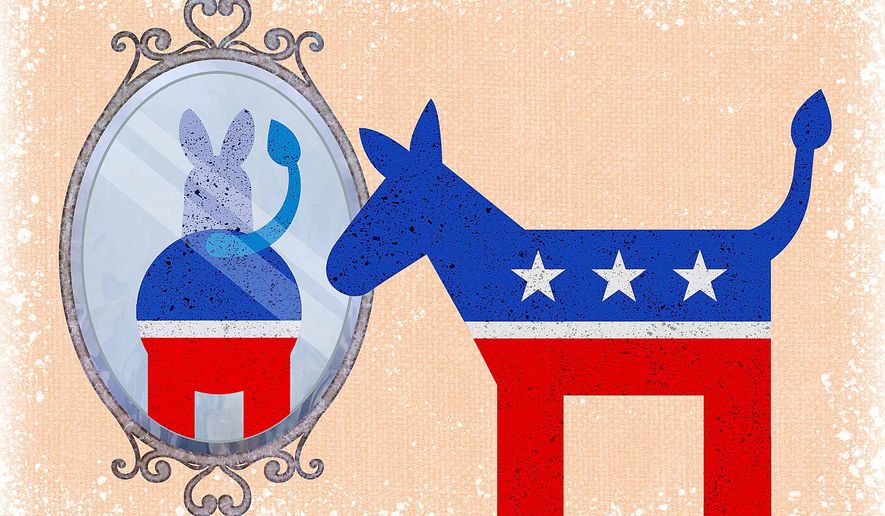OPINION:
You know the story — Narcissus was the son of the river god Cephissus. He ran in the foothills and forests of Greece, he joined with the fawns and dryads in the woodland sports as they ran in the fields and climbed the mountains. He was incredibly handsome.
One day, after an exceptionally good hunt, Narcissus came upon a calm, clear pool carved out in the bend of a river. Exhausted, he stooped down to take a drink and was stunned to see his own reflection. Captivated, Narcissus gazed at his image. “Ah,” he said to himself, “not Bacchus, Apollo, or even Zeus in all their glory surpass such allure as mine.”
As time went by, Narcissus could not pull himself away. He just stayed by the river’s edge. Day after day, he hovered over the pool, gazing at himself. Weeks passed, and Narcissus became so self-infatuated he forgot to think of anything else, even food or rest. He became increasingly emaciated. He lost his color, his vigor and his strength, until finally, in one last attempt to preserve his own fading beauty, Narcissus reached out to embrace his reflection.
He slipped, fell into the pool and drowned.
In love with himself, Narcissus died, leaving nothing but the faint hint of Echo’s voice in a distant valley as she pined after the loss of such wasted beauty.
I couldn’t help but think of this story recently when I was confronted by a young millennial scholar who fancied himself my intellectual superior. As such, he took great pride in his progressive ideas and disagreed with my antiquated “conservative” thinking. “The problem with you conservatives,” he said, “is that you are arrogant. You think you have all the answers. You think you are always right.”
My response?
At the risk of being a bit pedantic, I have a point of clarification as well as a couple questions before I offer a final answer to my young friend.
First, the clarification: The difference between conservatives and progressives is not that conservatives think they are right and progressives don’t. To the contrary, any healthy debate presupposes that one person believes his or her ideas are right while contending that another person’s ideas are wrong. By definition, a disagreement assumes mutual dissent.
Common sense (as well as Webster) tells us a dispute involves arguing one thesis against another. Both parties think they have the correct answer. Both are confident in the accuracy of their position. Both believe the other person’s ideas are mistaken. Wouldn’t it be a silly waste of breath to disagree if we had no confidence in the “rightness” of our own position and the consequent “wrongness” of opposing views?
Surely, we can agree that progressives and conservatives are equally confident in thinking they have the better ideas. It seems obvious that my young friend who claimed to be “right” in criticizing me for claiming to be “right” needs to remember that one accusing finger pointed at others is often outnumbered by several fingers pointed back at oneself.
It isn’t the degree of confidence that distinguishes one “believer” from another but rather it is the source of confidence. The progressive claims there is no final answer. All truths are merely the consequence of social constructs and human preference. People are the source of their own truth.
The conservative disagrees, saying truth is bigger than this. It is an objective fact beyond our ability to create. It is out there. It is real. It is given from above and revealed on the heart. Thus, the real difference is that one man claims to be the source of truth while the other claims to be its recipient.
Now, a question (or two or three): Why is it arrogant for me to say “I don’t have all the answers but I believe there is one” and yet humble for my millennial challenger to proclaim with narcissistic confidence that “There is no final answer. Truth is what I decide it is. I am the final judge. I am the final arbiter of what is right and wrong, true and false, beautiful and ugly?”
Is it possible that my detractor might do well to set aside his chronological snobbery, for just a second or two, and consider the story of Narcissus? As my smarter-than-thou friend stands at the edge of today’s political pool staring lovingly at his own image, his own opinions, his own preferences and his own desires, perhaps he would do well to ask himself if that image he is reaching out to embrace is really the exemplar of humility he fancies it to be.
Are conservatives arrogant for believing in something they believe is always “right?” Maybe my progressive critic would do well to take a humble look in the mirror and remember that it isn’t arrogant, after all, to fall in love with something bigger than yourself.
• Everett Piper, president of Oklahoma Wesleyan University, is the author of “Not A Day Care: The Devastating Consequences of Abandoning Truth” (Regnery 2017).




Please read our comment policy before commenting.